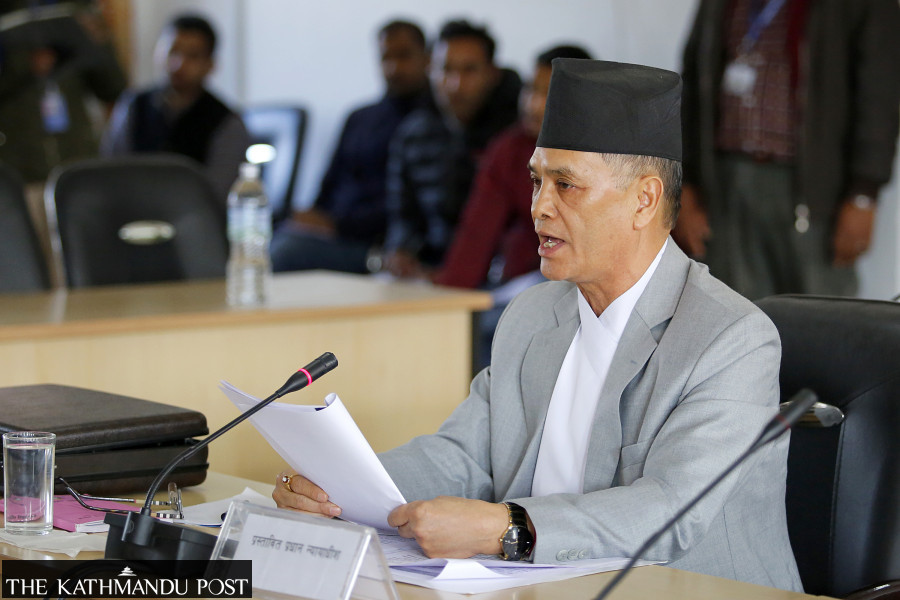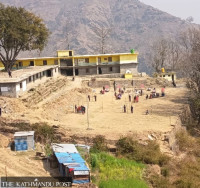National
To impeach or not to impeach? Political parties at their wits’ end
Amid calls for resignation of Rana, who has refused to budge, politicians wonder whether they should make a move in Parliament to remove the chief justice.
Anil Giri
Confrontation in the Supreme Court is escalating by the day. Justices, Nepal Bar Association, Supreme Court Bar Association, former chief justices and networks of judges want Chief Justice Cholendra Shumsher Rana to quit. But Rana has refused to budge.
Some sections are now demanding that Rana be impeached. And to impeach Rana, political parties need to take the initiative, as Parliament is the only legitimate institution that can defenestrate the chief justice.
But Nepal’s political parties are by and large silent on the ongoing crisis in the judiciary. They are divided on the issue.
The ruling Nepali Congress and the Communist Party of Nepal (Maoist Centre) do not seem keen on impeaching Rana. Two other coalition partners, CPN (Unified Socialist) and the Janata Samajbadi Party, are too small. Technically, the Congress and the Maoist Centre also lack the numbers individually to even file an impeachment motion.
The only party that has enough members in Parliament to move an impeachment motion is the main opposition CPN-UML. But the party views the ongoing controversy in the judiciary as an outcome of the problems in the ruling coalition.
As hearings have been affected by the ongoing row in the Supreme Court, justices are concerned. They cannot afford to boycott benches for long, as they know it would be morally wrong to deprive the public of their right to justice.
The justices are said to have been communicating to the parties to make a move to remove Rana from office.
At least two top political sources told the Post that the agitating Supreme Court justices have communicated to the ruling and opposition parties that they are not going to backtrack on their demand for Rana’s resignation and that if the chief justice refuses, they will rather step down en masse.
“The situation is grave. It’s tricky,” said a Nepali Congress leader. “The agitating justices know very well that the longer the deadlock continues, the more people will suffer. We have been intimidated that if Rana refuses to resign, they will resign.”
That situation, however, looks unlikely, and it may be a way to put pressure on political parties to take impeachment initiatives, according to some politicians the Post spoke to on Wednesday.
To register an impeachment motion in Parliament, at least one fourth of the total lawmakers have to sign the motion. The chief justice is automatically suspended as soon as the motion is filed. But a two-thirds majority has to pass the motion to impeach the chief justice.
Given the composition of the House, such a motion cannot be passed by a two-thirds majority unless all the parties vote for it.
In the lower house, the UML currently holds 97 seats, the Nepali Congress 61, the Maoist Centre 49, CPN (Unified Socialist) 23, Janata Samajbadi Party has 19 and the Loktantrik Samajbadi Party 13. Nepal Majdoor Kisan Party, Rastriya Janamorcha Nepal and Rastriya Prajatantra Party have one lawmaker each. There is one independent lawmaker.
Numbers, however, are a technical thing. The question is whether any of the political parties indeed agrees to the demand of justices and lawyers that Rana should resign. Parties are not yet sure if Rana is the root cause of all the ills in the judiciary. After all, political parties share equal blame for bringing the judiciary to disrepute.
The parties hence are hemming and hawing to speak on the current crisis in the judiciary. And they are engaged in a blame game.
The Nepali Congress is sitting on the fence. After all, it is leading the government because of the Constitutional Bench led by Rana, which on July 12 ordered restoration of the House dissolved by KP Sharma Oli and appointment of Sher Bahadur Deuba as prime minister.
Deuba on Wednesday hit out at Oli, saying it was an irresponsible statement by the leader of the opposition to demand the resignation of all five justices who ordered appointment of the Congress leader as prime minister.
On Tuesday, Oli said that the five justices of the Constitutional Bench were wrong to overturn his decision to dissolve the House.
The bench on July 12 observed that Oli’s decision to dissolve the House was “unconstitutional and undemocratic”.
Oli’s statement on Tuesday was close to what Rana said.
Rana on Tuesday told justices that he was ready to resign if other justices who have come into question also agree to do so, in an indication that the Constitutional Bench that ordered Deuba’s appointment had four more justices as members.
The controversy surrounding Rana has surfaced at a time when a number of “crucial” cases are awaiting either hearings or rulings.
A case is pending on a petition by the UML against the Speaker for ignoring the party’s decision to expel 14 lawmakers including Madhav Nepal, who has formed the CPN (Unified Socialist). The UML has also challenged the Election Commission for registering a new party under Nepal.
Madhav Nepal is a long-time UML politician who chose to form the new party after his months-long struggle against Oli.
A case against Agni Sapkota, the House Speaker, is also pending. Sapkota, a Maoist leader, faces a murder charge.
A case against Madhav Nepal and Baburam Bhattarai, a leader of the Janata Samajbadi Party, is also pending in relation to the Lalita Niwas land scam.
The Supreme Court has not heard petitions against constitutional appointments for about 11 months. These appointments were made during Oli’s tenure as prime minister and Rana’s role had been crucial. Rana as the chief justice is a member of the Constitutional Council that made the recommendations.
In all these cases, the country’s one or the other party is involved.
On Wednesday, the UML said it has no plans to move an impeachment motion against the chief justice.
“We are not in favour of registering an impeachment motion against Rana,” Pradeep Gyawali, spokesperson for the UML, told the Post in a brief interview over the phone.
According to him, even the Nepali Congress is not going to do so.
A Congress leader admitted that the ruling alliance is not going to table an impeachment motion against Rana.
“Why should the ruling alliance move an impeachment motion against someone who led a bench that issued two back to back verdicts against Oli’s decision to dissolve the House paving the way for the formation of this government led by Deuba,” the leader said.
Now that neither the ruling coalition nor the opposition wants to impeach Rana, the question arises who actually wants the removal of the chief justice and why.
Those calling for Rana’s resignation say they want restoration of the judiciary's independence which is not possible under the current chief justice.
Gyawali, the UML spokesperson, disagrees.
“The present campaign is not aimed at cleaning up the judiciary. There is an alliance of opportunists who want to take advantage after the chief justice is ousted,” said Gyawali. “What we need is breaking the nexus between political parties and the judiciary, but unfortunately this is not on the agenda.”
According to him, all Supreme Court justices are equally responsible for the current mess and the chief justice alone cannot be made a scapegoat.
“And after all, how come the savior of democracy suddenly became a villain overnight?” said Gyawali, referring to Rana who restored the House twice.
Gagan Thapa, a Nepali Congress leader, said that the Supreme Court is indeed in trouble and that it seems those justices who are seeking Rana’s resignation are unlikely to backtrack or compromise.
“It’s true that major political parties should find a way out of the present crisis in the judiciary. The prime minister has clearly said that the matter would be discussed at the coalition’s meeting,” said Thapa. “Sooner or later, either the court itself or political leadership should resolve this dispute. As of now, Rana appears firm on his position [not to step down]. Nor do justices are in a mood to relent. So the situation is indeed critical.”
A lack of consensus among the coalition partners and the opposition’s position that the current crisis in the judiciary is an outcome of “some vested interests” could prolong the deadlock.
A CPN (Unified Socialist) leader said the ruling coalition is currently in a “wait and see” mode.
Narayan Kaji Shrestha, a senior Maoist Centre leader, said if Rana refuses to resign, the only way to oust him is an impeachment motion.
“Filing of such a motion will mean the chief justice’s immediate suspension, but the question is if the ruling coalition wants it or not,” Shrestha told the Post. “For now, it’s up to the stakeholders in the judiciary to find a way out. There is no doubt that the judiciary is facing a crisis.”




 27.41°C Kathmandu
27.41°C Kathmandu














